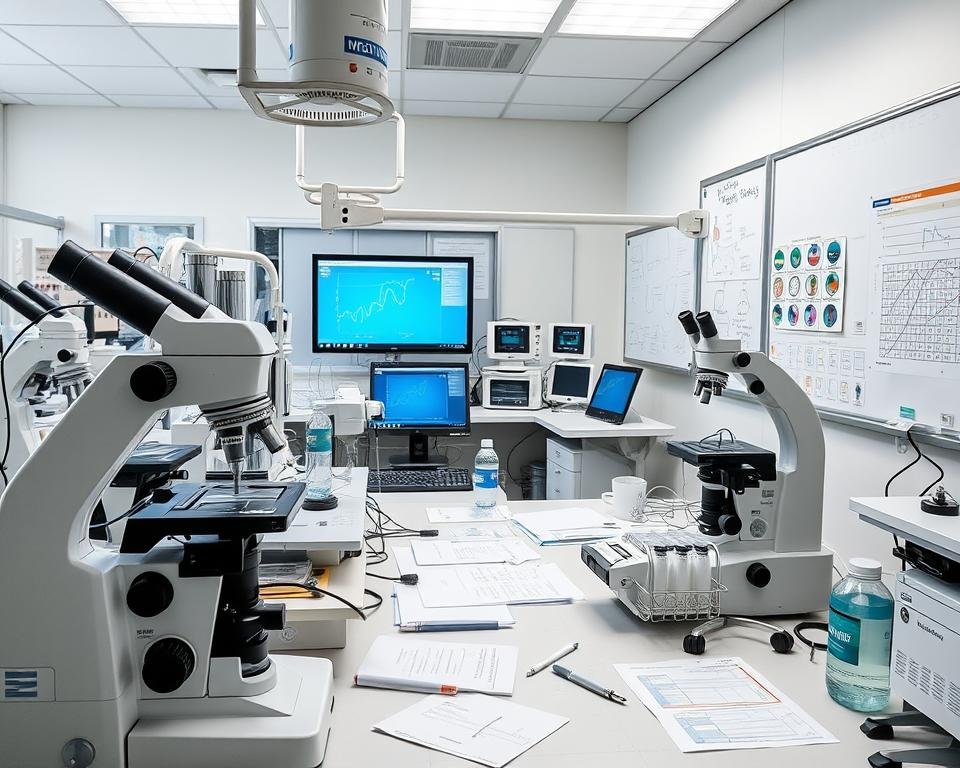Clinical researchers are key in the pharmaceutical and healthcare fields. They work with patient data to study health and disease. They also help develop new treatments and run clinical trials.
They set up, coordinate, and oversee clinical studies. This is to test new or existing products. They check if these products are safe and work well.
Clinical researchers work in pharmaceutical companies, Contract Research Organizations (CROs), or hospital departments. They use their knowledge to help medical science grow. They also help create new treatments.
The job of a clinical researcher is very broad. They design and carry out research plans. They also analyze data and share their findings.
These experts are vital in the success of clinical trials. They make sure trials follow rules and ethics. By using their skills, they help make medicines that save lives. They also improve how patients are treated.
What Is a Job Description of a Clinical Researcher
Clinical researchers are key in drug development. They plan, prepare, and conduct clinical trials. They act as the main point of contact for many groups, like doctors and pharmacists.
Core Functions and Responsibilities
They create study plans, manage supplies, and collect data. They also check data and make sure subjects are safe. They submit documents for approval.
They work with teams to make sure trials go well. They follow rules and guidelines closely.
Work Environment Overview
Clinical researchers work in many places, like pharmaceutical companies and hospitals. They team up with doctors and data analysts. Together, they handle the clinical trial responsibilities and biomedical scientist tasks in drug development processes.
Industry Settings
They work in many fields, including pharmaceuticals and academia. Their work helps bring new medical discoveries to life. It also improves health care for patients.

“Clinical researchers are the essential link between scientific discoveries and their real-world application, driving innovation in healthcare and medicine.”
Essential Skills and Qualifications Required
To start a career in clinical research, you need a solid foundation. Most start with a bachelor’s or master’s degree in life sciences. This includes biology, microbiology, medicine, and more. For top roles, a Ph.D. is often needed.
Skills like computer skills, communication, and organization are key. You also need to be flexible, accurate, and honest. Knowing Good Clinical Practice (GCP) and having experience in hospitals or labs is a plus. Knowledge in areas like oncology is also important for some jobs.
- Strong communication skills to work well with teams
- Proficiency in clinical data analysis and data systems
- Ability to write well for scientific publications
- Flexibility to keep up with the fast life sciences world
- Attention to detail for accurate trial data
- Problem-solving skills for trial challenges
These skills help clinical researchers succeed. They drive science forward and help create new medical treatments. Staying updated with new knowledge is vital in this field.
“The ability to think critically, adapt to change, and analyze data with precision are the hallmarks of a successful clinical researcher.”
Starting a career in clinical research needs a mix of knowledge and skills. You must be good at analyzing data and working well with others. By focusing on these areas, you can thrive in this important field.
Retail job interview role-play tips
Clinical Trial Management and Coordination
Clinical researchers are key in managing and coordinating clinical trials. They handle everything from protocol development to finding patients and checking quality. Their work ensures trials are run smoothly and ethically.
Protocol Development Process
They design and write the study’s plan, forms, and consent documents. This work is vital for a trial’s success. It makes sure the trial follows rules and guidelines.
Study Implementation Strategies
After the plan is set, clinical researchers pick sites and recruit investigators. They work with sponsors and sites to follow the protocol and laws.
Quality Control Measures
Keeping quality high is a big part of their job. They check how investigators do, fix problems, and follow the plan. They also handle supplies and logistics, showing how pharmaceutical research roles are key to quality data.
“The success of a quality clinical research program is critical. It shows how important a top-notch clinical research team is.”
Data Management and Analysis Responsibilities
Clinical researchers are key in keeping clinical studies and databases accurate. They design data tools, set up databases, and manage data flow. They also check data, make corrections, and do audits to keep data reliable.
They also do statistical analyses, summaries, and reports for product development and regulatory submissions. They need skills in SAS and programming for these tasks. Plus, they write manuscripts for journals and prepare presentations for meetings, showing their clinical data analysis and scientific writing for publications skills.
By carefully managing and analyzing clinical data, researchers make sure trial findings are top-notch. This helps in making safe and effective medical treatments. Their work ensures research meets the highest scientific and regulatory standards.